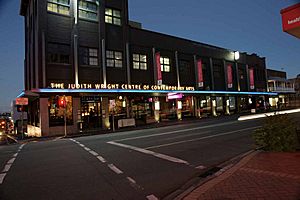Judith Wright facts for kids
Quick facts for kids
Judith Wright
|
|
|---|---|
| Born |
Judith Arundell Wright
31 May 1915 Armidale, New South Wales, Australia
|
| Died | 25 June 2000 (aged 85) Canberra, Australian Capital Territory, Australia
|
| Occupation |
|
| Spouse(s) | Jack McKinney |
| Children | Meredith McKinney |
| Awards | Queen's Gold Medal for Poetry (1991), Australian National Living Treasure Award (1998) |
Judith Arundell Wright (born May 31, 1915 – died June 25, 2000) was an important Australian poet. She was also a strong voice for the environment and worked hard for Aboriginal land rights. She received many awards, including the Australian National Living Treasure Award in 1998.
Contents
About Judith Wright's Life
Judith Wright was born in Armidale, New South Wales, Australia. She was the oldest child of Phillip Wright and Ethel. She spent most of her childhood in Brisbane and Sydney. After her mother passed away early, she lived with her aunt. Later, she attended New England Girls' School.
After finishing school, Judith studied at the University of Sydney. She learned about Philosophy, English, Psychology, and History. When World War II began, she went back to her father's farm. She helped out because many workers had gone to war.
Becoming a Poet
Judith Wright's first book of poems was called The Moving Image. It was published in 1946. At that time, she was working as a researcher at the University of Queensland. She also worked on a literary magazine called Meanjin.
In 1950, she moved to Mount Tamborine, Queensland. She lived there with Jack McKinney, a novelist. Their daughter, Meredith, was born that same year. Judith and Jack got married in 1962. Sadly, Jack passed away in 1966.
In 1966, Judith published her first collection of short stories, The Nature of Love. These stories were mostly set in Queensland. She was even nominated for the Nobel Prize for Literature in 1967.
Judith Wright started to lose her hearing in her mid-20s. By 1992, she became completely deaf. She passed away in Canberra on June 25, 2000, when she was 85 years old.
Judith Wright's Poetry
Judith Wright wrote many collections of poetry. Some of her famous works include The Moving Image, Woman to Man, and Birds.
Her poems often focused on the beautiful Australian environment. She wrote about the relationship between settlers, Indigenous Australians, and the Australian bush. Her poetry explores how people connect with nature. She used images of Australian plants and animals in her work. Her poems also looked at the power of language and how our inner feelings connect with the world around us.
Her poems have been translated into many languages. These include Italian, Japanese, and Russian.
The Birds Collection
In 2003, a special edition of Judith Wright's collection called Birds was published. Most of these poems were written in the 1950s. This was when she lived on Tamborine Mountain in Queensland.
Her daughter, Meredith McKinney, said these poems were written during a happy time in her mother's life. The poems often have a relaxed and friendly tone. They show a sense of humor and closeness. However, they also talk about the difficult parts of life, like pain and death. The poems also show how much damage humans have done to our world, even though we love it.
Environmental and Social Activism
Judith Wright was very well known for her work to protect the environment. She campaigned to save the Great Barrier Reef and Fraser Island. She helped start one of Australia's first nature conservation groups.
She was also a strong supporter of the Aboriginal land rights movement. She wrote powerful letters to leaders, like the Australian Prime Minister, about this issue. She strongly believed in fairness for Aboriginal people. Shortly before she passed away, she joined a march in Canberra. This march was for reconciliation, which means bringing non-Indigenous Australians and Aboriginal people together.
Awards and Recognition
Judith Wright received several important awards for her work:
- 1976 – Christopher Brennan Award
- 1991 – Queen's Gold Medal for Poetry
- 1994 – Human Rights and Equal Opportunity Commission Poetry Award for Collected Poems
In 2009, she was named one of the Q150 Icons of Queensland. This recognized her as an "Influential Artist."
Places Named After Her
Many places and awards have been named in honor of Judith Wright.
In 2006, it was announced that a new federal voting area in Queensland would be named "Wright." This was to celebrate her achievements in arts, conservation, and Indigenous affairs. Later, a different name was chosen. However, in 2009, a new voting area in Queensland was created and named "Wright" in her honor. It was first used in the 2010 election.
The Judith Wright Arts Centre in Fortitude Valley, Brisbane, is named after her.
In 2008, a future suburb in Molonglo Valley, Canberra, was named "Wright." There is also a street named after her in the Canberra suburb of Franklin.
The Judith Wright Award was given for published poetry books by Australian poets between 2005 and 2011. The Judith Wright Poetry Prize for New and Emerging Poets was started in 2007 by Overland magazine. It offers a prize of $20,000.
 | Precious Adams |
 | Lauren Anderson |
 | Janet Collins |


